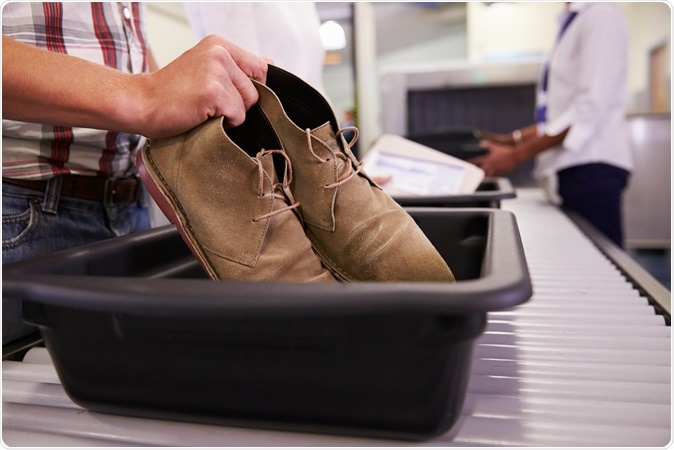A team of researchers from Finland and Britain have shown that over half of all the trays or security bins that the airport authorities use at the security clearance areas carry viruses that can cause respiratory infections.
It is advisable to wash ones hands after passing through the airport security clearance, say researchers. In this new study published last week in the BioMed Central Infectious Diseases, the team tested the surfaces of a sample of plastic airport security bins from Helsinki Airport. These were obtained from the airport at three different occasions during the peak flu season in 2015 and 2016. Authors from Finland’s National Institute for Health and Welfare and the University of Nottingham collaborated in this study.

Image Credit: Monkey Business Images / Shutterstock
Results revealed that of the eight samples, four contained rhinovirus or adenovirus. These viruses are responsible for colds and respiratory infections. The authors concluded that these screening trays, “commonly contaminated” and are surfaces from which most passengers are likely to catch harmful viruses. They write, “We found the highest frequency of respiratory viruses on plastic trays used in security check areas for depositing hand-carried luggage and personal items. These boxes typically cycle with high frequency to subsequent passengers, and are typically seized with a wide palm surface area and strong grip.” The risk is greater for Americans they explain because these passengers are required to empty their food and snacking items directly onto the plastic bins.
The authors have warned that these airports can be a potential risk area from where infections can spread to even “pandemic” proportions. Pandemics are those that affect and spread to countries located in more than one continent. They cite previous examples of the SARS outbreak in 2002 and the Ebola pandemic in 2014.
The researchers conclude from this study that all airports should provide hand sanitizers to the passengers before and after entry into each of the security checkpoints and these trays should undergo rigorous cleaning and disinfection at frequent intervals. They write, “This knowledge helps in the recognition of hot spots for contact transmission risk, which could be important during an emerging pandemic threat or severe epidemic.”
It is only frequent cleaning, they write, that renders the toilet seats relatively less contaminated with these viruses. They took swabs from 42 toilet seats, lids, flush buttons, door knobs and locks etc. at the airport and found that there were no viruses on them. They wrote that since passengers pay more attention to hygiene and hand washing in the washrooms, there are no respiratory viruses on these surfaces.
The team looked for viruses in the airport and noted that there was a high frequency of these cold viruses even on the buttons of the Helsinki Airport pharmacy’s payment terminal. Quite evidently around half of the samples tested positive for rhinovirus and human coronavirus. One in three sample swabs from the glass dividers and the desks at the passport control checkpoint tested positive for rhinovirus. Further toys at the airport’s children’s play area showed very high rates of contamination with these cold viruses with one toy testing 67 percent positive.
A simple solution, write the researchers, would be to wipe down these surfaces frequently with disinfectants. They explain that there are several “cleaning agents, household (antibacterial) wipes and anti-viral tissues” that can kill these cold viruses and even the flu virus and reduce the risk of “indirect contact transmission” that occurs through coming in contact with a contaminated surface.
Citation: Deposition of respiratory virus pathogens on frequently touched surfaces at airports, Niina Ikonen, Carita Savolainen-Kopra, Joanne E. Enstone, Ilpo Kulmala, Pertti Pasanen, Anniina Salmela, Satu Salo, Jonathan S. Nguyen-Van-Tam, Petri Ruutu, BMC Infectious Diseases, https://doi.org/10.1186/s12879-018-3150-5